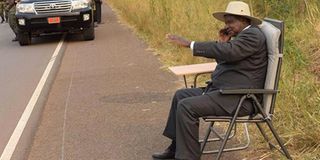'Lack of political will delays access to affordable phone calls in Africa'

President Museveni makes a phone call on his way from Kyeirumba village in the Isingiro District in July 2016. File photo
What you need to know:
- The current statistics from several telecom companies and reports indicate that excise duty revenue to the government on voice calls has declined, whereas telecom company revenue has fallen.
- In 2015, MTN Uganda revealed that its revenue from out-going calls had fallen 2 per cent partly because of ONA.
Kigali, Rwanda – When four countries in East Africa, Kenya, Rwanda, Uganda and South Sudan made the decision to create a “One Network Area (ONA)” for phone calls, this drastically brought down the cost of making calls.
Cross-border traffic originating from those countries was capped and roaming charges were eliminated. According to 2015 research by the International Telecommunications Union (ITU), “Cross-border voice traffic has grown rapidly since ONA implementation, tripling in both Kenya and Uganda with a nearly five-fold increase in Rwanda and a thirty-fold increase in South Sudan.” ITU also noted there was potential for ONA to be extended to several African countries.
However, according to Rwandan president Paul Kagame, the implementation of such an initiative across the continent is being hampered by the lack of political will among African countries – given its benefits.
“The delay that has been there is not because of technology. It is not lack of knowledge. In Africa, we lack infrastructure but that integration has not been because we lack infrastructure. I think it is because we lack that sense of urgency to make what we already have in place to work for us and work for us to have that achieved because even before we talked about integration and having One Network Area, there was that possibility, in any case, waiting for us to do what needs to be done,” he said during the Leaders’ Summit session at the Transform Africa Summit 2017, at the Kigali Convention Centre in Kigali, Rwanda.
For instance, a Uganda roaming in Tanzania – with an MTN line – will spend about Shs2500 per minute on phone call. However, when roaming in Kenya and Rwanda, that cost is Shs360 per minute. The benefits, according to a World Bank World Development Report on the ONA, include “increased trade, enhanced regional integration and reduced costs of doing business, as well as increased revenues to the operators and the governments.”
Mr Kagame notes that the benefits of ONA cut across for all the players – the government, the private sector, and citizens – but because there is slow progress and “lack of knowledge” on some of the concerns, implementation drags on.
“Maybe some people genuinely either feeling that they were going to lose while others are gaining. I thought that was a result of maybe lack of understanding….in actual fact, everybody benefits; be it the people who have invested in these technologies. Be it the ordinary citizens… maybe profits didn’t go as high as people want because when people make investments, they want to make a kill on the side of profit. They want to profit as much as they can. They are not willing to have a reasonable profit so that the benefits spread to more people,” he added.
The current statistics from several telecom companies and reports indicate that excise duty revenue to the government on voice calls has declined, whereas telecom company revenue has fallen. In 2015, MTN Uganda revealed that its revenue from out-going calls had fallen 2 per cent partly because of ONA. Additionally, it brought the rise of gray routing where international calls are diverted to ONA regions, leading to loss of revenue. This, however, is considered a loophole in the ONA implementation.




